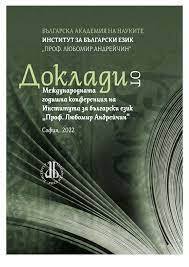Екзистенциални и модални предикати и онтология на състоянията
Existentials, Modals and the Ontology of States
Author(s): Anton Zimmerling
Subject(s): Language studies, Language and Literature Studies, Theoretical Linguistics, Applied Linguistics, Lexis, Comparative Linguistics, Philology
Published by: Институт за български език „Проф. Любомир Андрейчин“, Българска академия на науките
Keywords: natural language ontology; Davidsonian states; modals; existentials; predicatives; Russian language; Bulgarian language; biclausality
Summary/Abstract: I discuss holistic and partial predicate ontologies, with focus on the realization of static spatiotemporal predicates in Russian and Bulgarian. I follow the distribution of three constructions with dative case marking on the semantic subject. Modern Bulgarian and Modern Russian share only one of them – dative-predicative structures (DPS), while Russian and Old Slavic languages also use dative-infinitive structures (DIS) as the main cue of expressing the meaning of external modality. The third type – hybrid predicates headed by a negative existential – is a bridge construction between DIS and DPS. Hybrid predicates like негде спать (no place to sleep), некого винить (no one to blame) originated in Old Russian as embedded DIS sentences, but drifted towards DPS. They are partly integrated in the ontology of the Modern Russian DPS construction and behave as modal predicatives with a number of deviating features.
- Page Range: 61-70
- Page Count: 10
- Publication Year: 2022
- Language: English
- Content File-PDF

